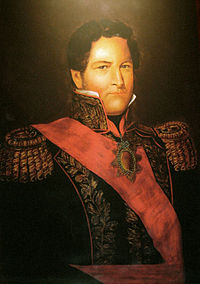Juan Manuel de Rosas Politician
Juan Manuel de Rosas (30 March 1793 – 14 March 1877), nicknamed "Restorer of the Laws", was a politician, army officer and caudillo who ruled Buenos Aires Province and briefly the Argentine Confederation. Although born into a wealthy family, Rosas worked hard and independently amassed a personal fortune, acquiring huge grants of lands in the process. As was common in his era, Rosas formed a private militia, enlisting his workers, and took part in the factious disputes that had led to endless civil wars in his country. Victorious in warfare, and having acquired influence, vast landholdings and a private army loyal exclusively to himself, Rosas became the quintessential caudillo, as provincial warlords in the region were known. He eventually reached the rank of brigadier general, the highest in the Argentine army, and became the indisputable leader of the Federalist Party.Rosas became governor of the province of Buenos Aires in December 1829 and established a dictatorship backed by state terrorism. In 1831, he signed the Federal Pact, recognizing provincial autonomy and creating the Argentine Confederation. When his term of office ended in 1832, Rosas departed to the frontier to wage war on the indigenous peoples. Rosas was recalled after his supporters launched a coup in Buenos Aires and became governor again. Rosas reestablished his dictatorship, formed the Mazorca (an armed parapolice), increased repression and resorted to terrorism once more, killing thousands in the process. Elections became a farce, and the legislative and judiciary became docile instruments of his will. Rosas created a cult of personality and his regime became totalitarian in nature, with all aspects of society rigidly controlled.Rosas encountered countless threats during the late 1830s and early 1840s. He fought a war against the Peru–Bolivian Confederation, endured a blockade by France, faced a revolt in his own province and battled a major rebellion that spread to several Argentine provinces that lasted years. Rosas persevered in all conflicts and established his influence in the provinces, exercising effective control over them through direct and indirect means. By 1848, he had extended his power beyond the borders of Buenos Aires and was ruler of all of Argentina. Rosas also attempted to annex the neighboring nations of Uruguay and Paraguay. France and Great Britain jointly retaliated against Argentine expansionism, blockading Buenos Aires for most of the late 1840s. They were unable to halt Rosas, whose prestige was greatly enhanced by his string of successes.When the Empire of Brazil began aiding Uruguay against Argentina, Rosas declared war in August 1851; starting the Platine War. This conflict had a short duration and ended with the defeat of Rosas and his flight to Britain. Rosas's last years were spent in exile where he lived as tenant farmer until his death in 1877. For a long time, Rosas was perceived as a brutal tyrant by Argentines. There was a small faction that painted Rosas in a more favorable light, however. Since the 1930s, an authoritarian, anti-Semitic, and racist political movement in Argentina called Revisionism tried to rehabilitate Rosas and establish a new dictatorship based on his regime. In 1989, his remains were repatriated by the government in an attempt to promote national unity, hoping that Argentines would forgive both him and especially the 1970s military dictatorship. Nonetheless, Rosas remains a controversial figure in Argentina.
Personal facts

| Birth date | March 30, 1793 |
|---|---|
| Birth name | Juan Manuel José Domingo Ortiz de Rosas |
| Birth place | |
| Nationality | |
| Religion | |
| Date of death | March 14, 1877 |
| Place of death | |
| Spouse | |
| Children | Manuela Terrero de Rosas |
Search
Office holder
| office | Governor of Buenos Aires Province |
|---|---|
| party | |
| successor |